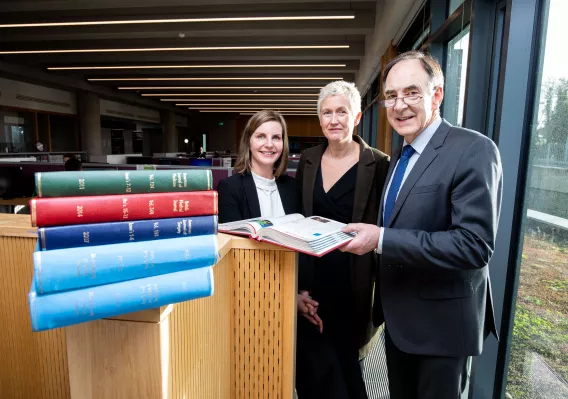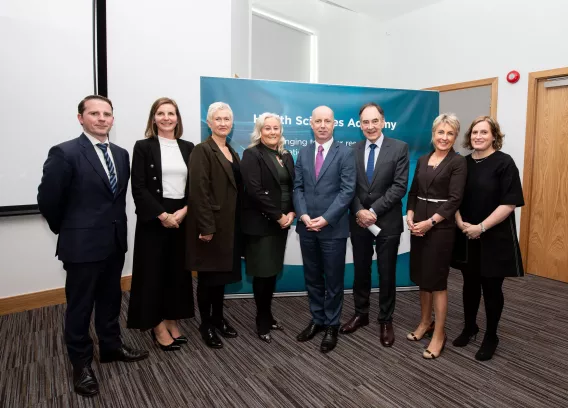
MINISTER of State for Mental Health and Older People, Jim Daly TD, said that “collaboration is a powerful tool” as he commended University of Limerick, UL Hospitals Group and HSE Mid-West Community Healthcare for working together on an exciting new chapter in healthcare service delivery and medical research.
Minister of State Daly was speaking at University Hospital Limerick (UHL) this Monday as he officially opened two flagship projects on the hospital campus, cutting the ribbon on the Clinical Education & Research Centre (CERC) and officially launching one of the most significant initiatives based in the facility, the Health Sciences Academy (HSA).
The Academy is a partnership between UL, the UL Hospitals Group and HSE Mid-West Community Healthcare that aims to become a global standard-bearer for improving patient care through medical research, education and clinical and community-based practice.
Ahead of the opening, Minister Daly explained: “It is vital that we look to encourage and support innovation, collaboration and integration in healthcare. The development of the Clinical Education & Research Centre alongside the Health Sciences Academy are significant initiatives in this regard, that will greatly benefit the Mid-West region and help improve patient care.”
Speaking at the event, he said that “bringing innovation to healthcare is the key to success”.
The CERC, a €12.75m facility developed in partnership between UL Hospitals Group and UL, and co-funded by the HSE and UL, is a 3,442m2 four-storey building that accommodates and supports the educational, training and research needs of the UL Hospitals Group medical community and the UL Graduate Entry Medical School (GEMS).
With a 150-seat lecture theatre and tutorial rooms, the CERC also has a library, offices for academic, administrative and technical support staff, research facilities, and a dedicated research area for the UL Health Research Institute.

And from today, the CERC building is also a vividly futuristic symbol of the Health Science Academy and its efforts to establish the Mid-West region as a global exemplar of hospital- and community-based health services that are driven by education, research and innovation and shaped by the needs of patients.
The Academy harnesses the energies of all three bodies, including UL’s Health Research Institute and its Clinical Research Support Unit with a focus on research projects that aim to enhance people’s health and wellbeing, and transform the health environment for the population.
The population of the catchment area of UL Hospitals Group and HSE Mid-West Community Healthcare is some 385,000 residents of Counties Limerick, Clare and Tipperary.
Ms Miriam McCarthy, Manager of the Health Sciences Academy, said: “The Health Sciences Academy is a bridge between the University of Limerick, UL Hospitals Group, and Mid-West Community Healthcare. It will bind together the organisations, moving the world of research, innovation and education intelligence at UL closer to the world of clinical expertise and practise in our hospitals and communities. Patient care priorities for the region, in hospitals and in community settings, will inform the research agenda and shape staff education needs, further reinforcing relationships between the three partner organisations.”
The Academy’s undergraduate and postgraduate programmes will develop students’ clinical and research skills as well as exposing them to the wealth of innovative and technological developments in collaboration with UL, which will help Midwest healthcare professionals to be leaders in their fields.
A Junior Health Sciences Academy is also being established, in order to embed the Academy’s collaborative ethos within primary, secondary and post-secondary education locally, to help create the conditions where the Mid-West healthcare and medical research leaders of the future can grow and flourish.
Professor Paul Burke, Chief Academic Officer of UL Hospitals Group and UL Vice Dean of Health Sciences, explained: “The Health Sciences Academy is about harnessing hospital-based and community-based clinical expertise and UL’s applied research and technologies in order to drive and create innovative solutions to real healthcare challenges through collaborations between clinical staff and researchers.”
Prioritised research areas include diabetes care, chronic obstructive pulmonary disease (COPD), acute kidney injury, cancer treatment and exercise in health (MedEx).
Current projects at the Health Sciences Academy include a clinical practice project on the care of people living with, or at risk of Type 2 Diabetes in the Mid-West.
Consultant endocrinologist and senior adjunct lecturer at UL, Dr Eoin Noctor, is working with a team of researchers and clinicians from primary care, secondary care and UL, to assess, develop and implement effective, evidence-based strategies for prevention, self-management and treatment of diabetes in the region.
All three partners in the Academy will make a significant, immediate and tangible contribution to improving existing services, while also identifying areas where further study and collaboration offers the potential to improve the care of people with diabetes living in the region.
Prof Burke points to Optimend, a collaboration involving UL, UL Hospitals Group and the Community Healthcare organisation, as a project that exemplifies what the Health Sciences Academy is setting out to achieve. Optimend has a specific objective of improving outcomes for patients aged over 65 years. It is a study of older patients in the Emergency Department at UHL, exploring the impact of early intervention by health and social care professionals in cooperation with their community based colleagues, using safe hospital admission avoidance protocols.
Optimend has shown that its recommended interventions can shorten the length of ED stays for older adults and reduce the rates of hospital admission compared with usual care pathways.
Ms Colette Cowan, CEO of UL Hospitals Group, said: “I’m delighted to welcome Minister Daly to University Hospital Limerick to open the CERC and the Health Sciences Academy, both of which I have prioritised during my time as CEO of UL Hospitals Group.
“The CERC is a world class educational and research facility, and the Health Sciences Academy will direct the energies of practitioners and researchers alike, in our hospital, community and academic settings to unite us in our common objective of improving health and wellbeing for people throughout the Mid-West,” Ms Cowan added.
Ms Maria Bridgeman, Chief Officer of HSE Mid-West Community Healthcare, said: “From a community perspective, there are real opportunities to develop integrated care pathways, in particular relating to chronic diseases. The health policy document, Slaintecare, recognises the importance of integrated care being delivered as close to home as possible, and the Health Sciences Academy can help realise this.”
Professor Rachel Msetfi, UL Dean of Education and Health Sciences, explained: “Through the Health Sciences Academy and CERC, we will continue to educate the next generation of medical professionals in a space that allows for innovation while also giving us a direct line into the health services.
“UL is listening to the needs of the healthcare systems and responding accordingly. CERC will be a two-way street of virtual and physical communications that will lead to real and tangible impacts in society.”
For more, see the Health Science Academy’s newly launched website at www.healthsciencesacademy.ie.
